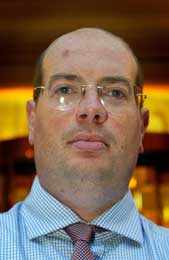 |
| Andrew Gilligan |
London, July 20 (Reuters): Long a benchmark for global journalism standards, Britain’s BBC is battling for its reputation in a political dogfight over the suicide of its source for a story on London’s case for war in Iraq.
The publicly funded broadcaster nicknamed “Auntie” was itself topping headlines with today’s confirmation the dead scientist was the main source for a report alleging Tony Blair’s government “sexed up” intelligence on Iraq’s weapons.
“The BBC is profoundly sorry that his involvement as our source has ended so tragically,” it said. The statement provided one of the last vital pieces in the jigsaw puzzle of events leading to the discovery of scientist David Kelly’s corpse with a slit wrist in a wood on Thursday.
But it merely fuelled the blame game, as some accused the BBC of bending its own standards to dubiously squeeze a sensational story out of its contact with Kelly.
“I think that heads should roll at the BBC,” said Robert Jackson, the legislator for Kelly’s local Oxfordshire area.
Often mistakenly perceived outside Britain as a state broadcaster, the BBC is a veteran of sometimes vicious disputes with successive British governments.
In the Kelly saga, the main claim against the BBC is that journalist Andrew Gilligan’s report — sensationally accusing officials of hyping up intelligence Saddam Hussein could deploy weapons in 45 minutes — did not reflect his contact with Kelly.
In Parliament, Kelly said on Tuesday he could not believe the Gilligan report came from him. “From the conversation I had I don’t see how he could make the authoritative statement he was making from the comments I made,” he said.
(According to The Daily Telegraph of London, Gilligan himself holds the government responsible for Kelly’s death. “David Kelly was hung out to dry. I have heard reports that he was threatened with the Official Secrets Act. How can anyone cope with that sort of pressure?” he has told friends.)
There were other accusations that the BBC actually heightened the pressure on Kelly by refusing earlier to confirm he was the source, thus contributing to media speculation around him and the tough grilling he got at the parliamentary inquiry.
The BBC was also under fire for having described Kelly as “a senior intelligence source” when he was only a bio-warfare expert with no role in British secret services. As the accusations flew, some experts were saying the case showed the BBC’s drive in recent years for more exclusives, to compete with round-the-clock news channel rivals, had compromised its reputation for accuracy and multi-sourcing.
“Here we have a source who denies having said what a BBC reporter claimed he said to him. And he is not the kind of source the BBC says he was,” media commentator Roy Greenslade said. “That’s just about as bad as journalism can ever get.”
The BBC countered, however, in its statement that it “believes we accurately interpreted and reported the factual information obtained by us during interviews with Dr Kelly.”
The truth, as some pointed out, may lie now in the grave.
Defending the BBC, some commentators said even if Gilligan’s reporting was shown to be dodgy — and the jury is still out on that — it would not tarnish the BBC’s decades-old reputation.
Some media colleagues stood by the BBC’s original decision to protect its source. “It’s an absolutely fundamental tenet. Who would trust any journalist if he caved in to pressure from the government to root out their source?” said Rod Liddle, a former BBC radio editor who hired Gilligan.
Steven Barnett, professor of communications at the University of Westminster, said Gilligan’s report was illustrative of a healthily aggressive modern approach to politics by the BBC, not a rotting of journalistic standards. “You can talk about how good Gilligan’s journalism was. But that is a separate issue,” he said.
“Anyone who believes in the role of an unintimidated press in a healthy democracy should stand up for and defend vigorously what the BBC was trying to do —investigate if the public was misled about the reasons for going to war in Iraq.”










